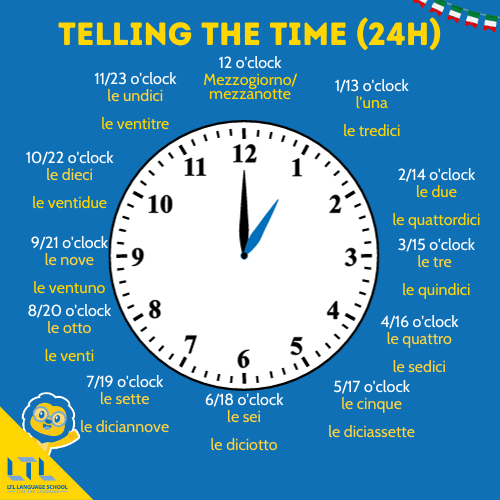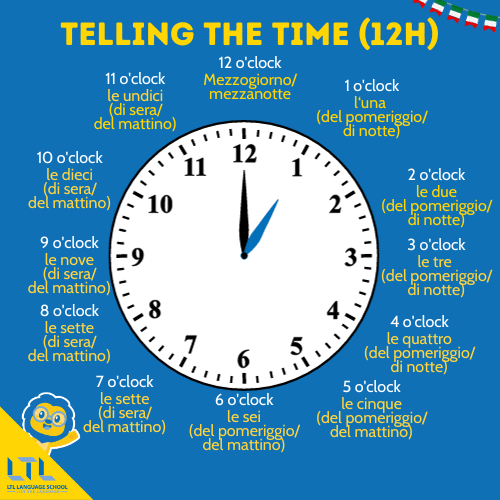Learn more, pay less. Summer discount up to 40% OFF

Italian Grammar Bank
HOW TO TELL THE TIME IN ITALIAN
In this free lesson we teach you how to ask and tell the time in Italian.
The first thing to keep in mind is that the word for “hour” in Italian is feminine.
With that in mind, let’s start!

HOURS IN ITALIAN
Telling the time in Italian is pretty simple if you already know Italian numbers between 1 and 24.
Below you can find all the names of the hours using both a 12h clock (which is more common in informal settings) and a 24h clock (mostly used in official contexts).
As already mentioned, keep in mind that when you’re talking about hours, you should add a feminine definite article before the number (except for “mezzogiorno” and “mezzanotte”, which do not want an article).
Also, notice that the number one “uno” becomes feminine (“l’una”).


As you can see, if you’re using the 12h clock system, sometimes it’s necessary to be as clear as possible, so you might want to add “del mattino/del pomeriggio/di sera/di notte” (in the morning/in the afternoon/in the evening/in the night) to avoid confusion.
You can say “del mattino” or “di mattina“: the meaning doesn’t change.
Midnight and Midday are almost never called “le dodici”:
in Italian, we say “mezzanotte” and “mezzogiorno”.
MINUTES AND SECONDS
To say minutes, simply add the word “minuti” after the numbers 2-59. To say “1 minute”, which is singular, you simply say “un minuto”.
The same happens with seconds (secondo/secondi).
17 minuti
17 minutesLe quattro e un minuto
4:01View More Examples:
| italian | english |
|---|---|
| Le 5 e venti minuti e 13 secondi | 5:20:13 |
| 28 minuti | 28 minutes |
| Le tre e trentatré minuti | 3:33 |
SPECIFIC WORDS & PHRASES
There are also some special expressions referring to specific hours. You can find them in the table below, along with an example for each of them.
| ITALIAN | ENGLISH | EXAMPLE | translation |
|---|---|---|---|
| …e un quarto | a quarter past… |
Mezzogiorno e un quarto
Mezzogiorno e quindici | 12:15 |
| …e mezza | half past… | Tre e mezza | 3:30 |
| …e tre quarti un quarto alle… | a quarter to… |
Tre e tre quarti
Tre e quarantacinque Un quarto alle quattro | 3:45 |
View More Examples:
| italian | english | example | translation |
|---|---|---|---|
| La mezza | 12:30 or 00:30 | Ci vediamo alla mezza | See you at 12:30/00:30 |
| …in punto | …on the dot | Ci vediamo alle 8 in punto | See you at 8:00 on the dot |
“In punto” is used when you want to emphasize a precise time or how punctual someone needs to be.
ASKING & TELLING THE TIME
Now, let’s move to something more practical: how to ask and tell the time in Italian.
These are the most common ways to ask for the time:
| Scusi, sa che ore sono? | I’m sorry, do you happen to know what time it is? (Formal) |
| Scusa, (sai) che ore sono? | Excuse me, (do you know) what time it is? |
| Che ore sono? | What time is it? |
| Che ora è? | What time is it? |
| Hai l’ora? | Do you have the time? |

To tell the time, you simply say:
| Italian | English |
|---|---|
| (Sono) le tre e mezza. | It’s half past three. |
| (È) l’una e venti. | It’s twenty past one. |
| (È) mezzogiorno. | It’s midday (Remember: no article here!) |
PATTERN
To be + Time
You can choose to omit the verb “to be”.
But, if you put it, remember that “una”, “mezzogiorno” and “mezzanotte” are singular (so you should say è), while all the other hours are plural (so you should say sono).
As in English, you usually omit the word “minuti”.
AT WHAT TIME SOMETHING HAPPENS
Now that you know how to tell the time, if you want to tell what time something happened, happens, or will happen, or to fix an appointment, you just need to remember to put the preposition “a” before the time.
PATTERN
A + Time
Since hours are always preceded by a definite article, the preposition a and the article will fuse together and form a “preposizione articolata” (articulated preposition), like in the examples below.
| A + l’una | All'una | At one o’clock |
| A + le tre e un quarto | Alle tre e un quarto | At a quarter past three |
| A + la mezza = alla mezza | Alla mezza | At 12:30 / at 00:30 |
View More Examples:
| A mezzanotte | At midnight |
| A mezzogiorno | At midday |
Now let’s see how to put them in a sentence:
Ci vediamo all’una e trenta.
See you at 1:30.Il treno parte alle quattro in punto.
The train leaves at 4:00 sharp.Ho finito di mangiare all’una.
I finished eating at 1:00.Alle quattro e tre quarti vado in palestra.
At 4:45 I go to the gym.If you need to ask the time of an event, you should say: “a che ora…?”
For example: “A che ora inizia la partita?” (At what time does the match start?)
DURATION
We saw how to give the time and how to set a time for an appointment, but what happens when you need to talk about a duration of time?
In that case, you will need to use the word ora / ore, and some other words:
| italian | english | example | translation |
|---|---|---|---|
| Ora/ore | Hour/hours | Il film dura due ore | The film is two hours long |
| Minuto/minuti | Minute/minutes | Ha parlato per dieci minuti | He talked for ten minutes |
| Secondo/secondi | Second/seconds | Il suono è durato solo pochi secondi | The sound only lasted for a few seconds |
| Un quarto d’ora | A quarter of an hour | Ci vediamo tra un quarto d'ora | See you in 15 minutes |
| Tre quarti d’ora | Three quarters of an hour | L'ho aspettato per tre quarti d'ora | I waited for him for 45 minutes |
| Mezz’ora | Half an hour | Il film è iniziato con mezz'ora di ritardo | The film started half an hour late |
View More Examples:
| italian | english |
|---|---|
| Ci aspetta un’ora e mezza di viaggio | We have an hour and a half drive ahead of us |
| Il volo dovrebbe durare due ore e tre quarti | The flight is expected to take two hours and 45 minutes |

Learn Italian with FlexiClasses
Book online classes with the best teachers in the industry.
FAQs
How do I ask the time in Italian?
The most common ways to do so are: “che ore sono?” and “che ora è?”
How do I say AM and PM in Italian?
AM is “di notte/del mattino/della mattina”, while PM is “del pomeriggio/di sera”, depending on the time.
Is there a difference between “che ora è” and “che ore sono”?
No, there is no difference in meaning.
Why is 1 o’clock “l’una” and not “l’uno”?
In Italian, the numbers used to indicate hours behave like feminine words.
Do Italians prefer the 12 or 24-hour system?
On the news and in formal documents you will always find the 24-hour system, while in everyday life you use the 12-hour one.
If I use the 12-hour system, do I always need to say “del mattino” etc?
No, it can usually be understood based on the context.









